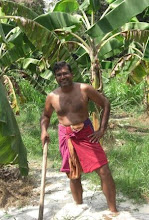
One of the lessons I have learnt especially in Sri Lanka, is that if anything is provided sans a sacrifice of some sort, those provisions, sometimes by other people sacrificing and foregoing are lost on the recipients. The latter do not appreciate the sacrifice the giver has suffered, and neither do they appreciate what they have received, often believing it is the duty of the giver to give no matter what.
This hypothesis is even more apparent when one is in Politics, where people demand things in a more brazen manner for future assistance which nevertheless cannot be guaranteed. People want a free lunch and object even to pay 10% of the cost. I believe for one to benefit from something, if one has sacrificed something to receive it, then one is more likely to make an effort to gain from the episode, or protect the object received by way of subsidy. How then can one wean them from total dependency to one where there is a partnership, one where it is 90% from the benefactor and 10% from the sacrifice of the recipient as a minimum?
I was at a local youth meeting yesterday, at which a sports club of young people received some sports goods, and two girls, one of them in the above photograph obtained some financial assistance to carry on her studies. We discussed a future event, which was a two day workshop at a location, where we expect around 200 to come and bond with each other and from it develop a core of young talent that can help the party as well as the local community in some way, promoting both leadership and accountability, along with a training from outside instructors of empowerment, and taking control of their lives. This would be something that is useful to any young person who is embarking on their life journey once they leave school and enter the tough world of the labor market.
I made a suggestion that each candidate contribute 10% which amounts to Rs200 to the program. The benefactor will contribute 90% of the cost of this two day workshop. The howls of anger that a charge would be made was instant! There was no charge in the previous workshop, so a repeat of the same formula was expected. Reason- ‘people will not come as they will not be able to contribute this sum’.
If a young person between the age of 18 and 25 cannot find Rs200 non refundable commitment to confirm their attendance, they do not deserve to get Rs20,000 worth of a leadership training that will cost us about Rs2000 to provide. This money is not from people who do not have a home or electricity. They are not the poorest. They are likely to spend that in a week on phone cards. The food cost saved at home for two days will be higher than this suggested contribution.


5 comments:
this is the typical Sri Lankan way.If anything is free we want them,even those things are not useful to us.Still wondering what the reason may be :)
I encourage you not to get discouraged by the negative attitude requiring them to pay 10% of the costs.
In your leadership training you should be trying to cultivate future leaders.
These people are the ones who will be able to see the value in the nominal participation fee.
Sometimes the people you are trying to help may be too far gone.
Focus on the ambitious ones who want to work and be a part of your organization.
Maybe you can say the fee is for the purpose of food, and give them an idea of what they will be getting to eat???
Once they go on one of your courses and have a good time, people will be fighting to have a chance to pay the Rs200 and participate.
Don't get discouraged. You are dealing with lankans, so you will have to start from scratch... like you did with your wild man from ampara who drank your bottle of cologne!
This is why I do not like 100% free education.
Nothing should be free. People should be made to pay even a fraction of the cost. The government pays for education but the recipients don't contribute anything to the country or society. Same goes for health. A minimum of at least 10/- should be charged.
The cycle of dependency begins in childhood and youth. Many parents coddle their kids into their 20s. With this, together with free education and political handouts, these kids grow up expecting their needs to be taken care of by others or by the govt. - D
Post a Comment